We live in a microwave society, and many want to take the elevator to success instead of the stairs. There is an app for everything, but many like to read and buy books. You should read roughly 500 pages every day if you want to succeed. Or, at least, that’s what Warren Buffet, possibly the most significant investor of all time, may say. Buffet estimates that he spends about 80% of his waking hours reading. Buffet believed that his job mainly consisted of gathering ever-increasing amounts of data and information and seeing if this resulted in any action. He also believed that knowledge accumulates in the same way compound interest does.
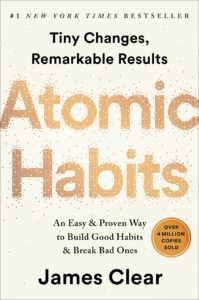
Atomic Habits by James Clear
Atomic Habits provides a tried-and-true framework for daily improvement, no matter your goals—one of the world’s best proficients in habit formation. James Clear breaks down practical tactics for forming good habits, breaking bad ones, and mastering the small actions that lead to excellent results.
The problem isn’t with you if you’re having problems changing your behaviors. Your system is the issue. Destructive traits happen over and over. Many people don’t want to evolve because you’re using the wrong change pattern. You will not achieve your goals. Your routine brings you down to their level. You’ll learn a tried-and-true system that can propel you to new heights.
Three Sentences for the Book
- An atomic habit is a regular practice or routine that is little and straightforward to perform and a source of incredible power; it is a part of the compound growth system.
- Destructive behaviors repeat themselves not because you don’t want to change but because you’re using the wrong change system.
- If you’re willing to continue with little, seemingly insignificant changes for years, they will compound into extraordinary benefits.
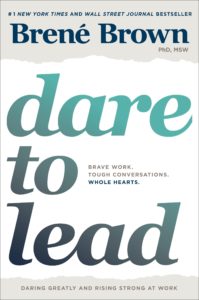
Dare to Lead by Brene Brown
Vulnerability is frequently manufactured out of today’s work cultures to make employees more efficient and less vulnerable to emotions—but strong leaders who have the fortitude to accept vulnerability are essential to successful work cultures. Dare to Lead deconstructs the four courage-building abilities that make up fearless leadership so you may develop a company that thrives in the face of danger, uncertainty, and failure. You’ll discover how to lead your team in connecting with vulnerability, acting with integrity, having more productive and honest dialogues, and rapidly moving on from failure—skills that will help your company’s culture meet today’s ever-increasing inventive and creative expectations.
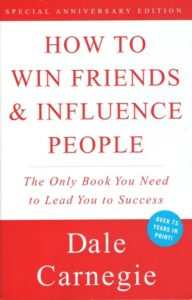
How to Win Friends and Influence People, written by Dale Carnegie
One pursues the job they desire and succeeds! You can take your current job and make it better! You can make any situation work! This top business book is a best-seller with over 15 million copies since its publication in 1936. Dale Carnegie’s debut book is a perennial best-seller, jam-packed with sound advice that has helped thousands of now-famous people climb the corporate and personal ladders to success. Dale Carnegie’s teachings are as relevant as ever and can help you accomplish your full potential in today’s complex and competitive world. Learn the six ways to persuade people to like you, the twelve ways to convince people to agree with you, and the nine ways to alter people without causing animosity.
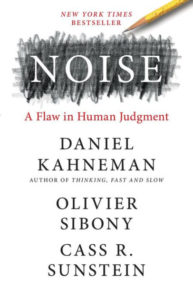
Noise by Daniel Kahneman, Olivier Sibony, and Cass R. Sunstein
Human judgments are out of the ordinary. They are influenced by various elements that differ between individuals, times, and situations. Some decisions are prejudiced in favor of or against specific phenomena, demonstrating a predictable, systematic deviation from acceptable human behavior, while others are unpredictably noisy. The authors of Noise draw attention to critical faults in human judgment, which they characterize as random/chaotic departures from targeted behavior that defy causal explanation. The book was written by Daniel Kahneman (Nobel Memorial Prize in Economic Sciences, 2002, and author of Thinking Fast and Slow), eminent legal scholar Cass R. Sunstein (author of Nudge), and Olivier Sibony, Professor of Strategy & Business Policy at HEC Paris, explains how to find and measure ‘noise,’ as well as how to avoid such flaws.
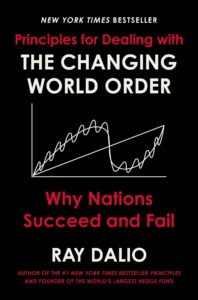
Principles for Dealing with the Changing World Order written by Ray Dalio
This top business book examines history’s most volatile economic and political periods to illustrate why the times ahead will likely be profoundly different from those we’ve known and offer practical recommendations on how to navigate them successfully. It explores history’s most chaotic economic and political times to provide lessons from famed money man best selling author Ray Dalio, who has spent half a century researching global economies and markets.
Ray Dalio recognized a combination of political and economic situations a few years ago that he hadn’t seen previously. Huge debts and near-zero interest rates led to massive money printing in the world’s three major reserve currencies; significant political and social disputes within countries, particularly the United States, as a result of the largest wealth, political, and values disparities in more than a century; and the rise of world power (China) to challenge the existing world order. Between 1930 and 1945, this confluence occurred for the last time. This discovery inspired Dalio to look for the recurring patterns and cause-and-effect correlations that underpin all significant changes in wealth and power in the previous 500 years.
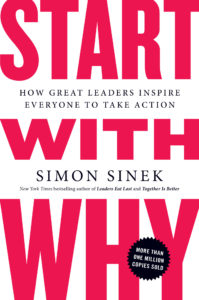
Start with Why: How Great Leaders Inspire Everyone to Take Action by Simon Sinek
Why are specific individuals and businesses more innovative, influential, and profitable than others? Why do some people have more customer and employee loyalty than others? Why are so few people, even among the wealthy, able to replicate their success? Although Martin Luther King Jr., Steve Jobs, and the Wright Brothers may have little in common, they all began with why. Their innate ability to start with why allowed them to inspire others and accomplish extraordinary things.
Simon Sinek revealed that the world’s most influential leaders all think, behave, and communicate in the same way—and it’s the polar opposite of what everyone else does. This powerful concept is known as The Golden Circle by Sinek, and it gives a framework for building companies, leading movements, and inspiring individuals. And it all starts with the question of WHY.
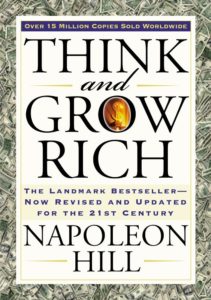
Think and Grow Rich! by Napoleon Hill
This is the first edition of Napoleon Hill’s classic business book, Think and Grow Rich, published in 1937. Except for minor formatting modifications, the text and formatting have been preserved as close to the original version as feasible.
This is a compilation of advice from over 500 of America’s most successful people. Their ideas were subsequently distilled into 13 principles, which Hill refers to as an “overarching philosophy of achievement.” Hill, refusing to allow Think and Grow Rich to be characterized solely as a method or system for success, declared that the book’s objectives were as follows:
- To assist the reader in becoming more self-aware.
- To help the reader comprehend how to become more effective in the face of the universe’s unchanging laws.
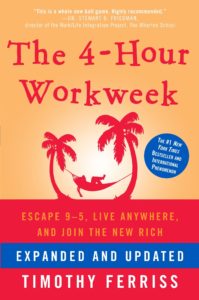
The 4-Hour Workweek by Timothy Ferriss
Many people aspire to retire as millionaires so that they may travel, own luxury cars and residences, and spend time with their friends and relatives. You don’t have to be a millionaire to do all of these things. You are not required to retire. In his book, entrepreneur, consultant, and lecturer Tim Ferriss demonstrates how anyone can live the retired millionaire lifestyle right now by following a four-step process: define, remove, automate, and free (DEAL).
So, what exactly do you do? Tim Ferriss finds it contesting to respond to the question. “I ride motorcycles in Europe,” he might say, depending on when you ask this contentious Princeton University guest professor. “In the Andes, I go skiing.” “In Panama, I scuba dive.” “In Buenos Aires, I dance tango.” He’s spent the last five years studying the secrets of the New Rich. This rapidly expanding subculture has abandoned the “deferred-life plan” in favor of mastering the new currencies of time and mobility to create luxury lifestyles in the present. This top business book is the compass for a unique and revolutionary society, whether you are an overworked employee or an entrepreneur locked in your firm.
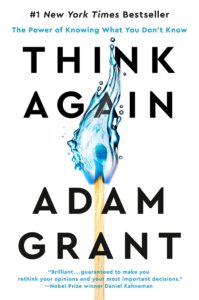
Think Again: The Power of Knowing What You Don’t Know by Adam Grant
Think Again is a book about the value of doubt and how we might improve our ability to embrace the unknown and the pleasure of being incorrect. Evidence shows that creative geniuses don’t stick to one identity and are continually open to reassessing their positions. Leaders who confess they don’t know everything and welcome critical input lead more productive and innovative teams.
According to new evidence, rethinking can be taught as a mindset and skillset, and Grant demonstrates how to develop the required traits. Section 1 investigates why we find it challenging to think again and how we might learn to do so independently, claiming that ‘grit’ alone can be detrimental. In section 2, we’ll look at how learning about ‘argument literacy’ might help us teach others to think differently. Finally, section 3 examines how schools, corporations, and governments fail to create cultures that encourage critical thinking. Learning to rethink may, in the end, be the secret skill that gives you an edge in a world that is maturing quicker than ever.
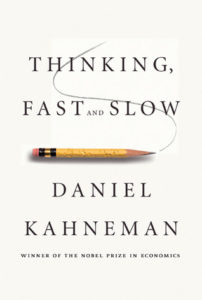
Thinking, Fast and Slow by Daniel Kahneman
Kahneman takes us on a pioneering tour of the mind in Thinking, Fast and Slow and breaks down the two systems that control how we think. System 1 is quick, intuitive, and passionate, while System 2 is slow, deliberate, and rational. Fast thinking’s tremendous capabilities and flaws and biases are revealed by Kahneman, who also uncovers the persistent influence of gut impressions on our thoughts and actions. The consequence of loss aversion and overconfidence in corporate systems, the hardships of anticipating what will make us content in the future, the challenges of adequately framing risks at work and home, and the profound effect of cognitive biases on everything from stock market trading to vacation planning—each of these can only be understood by understanding how the two systems interact to shape our judgments and decisions.
Kahneman immerses the reader in a lively conversation about how we think, displaying where we can and cannot entrust our intuitions and how we might gain from uneventful thinking. He provides practical and insightful insights into how we make decisions in our professional and personal lives and how we can utilize various tactics to avoid the mental blunders that frequently get us into difficulty. Fast and Slow Thinking will change the way you think about thinking.
Action Plans
It’s no secret that leaders are voracious readers. Reading about the tactics, tales, and advice of people who had gone before us and succeeded (or failed) can help jumpstart a journey and expand a business. “People who can’t read have no edge over those who can,” says author Ryan Holiday. Business books provide first-hand accounts of how others overcame the identical difficulties you face. They can teach tricks and generate concepts. They can demonstrate new ways of thinking or living, provide a unique perspective, or provide much-needed motivation. They keep you from going down a rabbit hole of making your own mistakes and having to learn everything from the ground up. Instead, you can learn from the downfalls of others. You’ll be able to recognize the red flags they missed and turn them in before it’s too late. You don’t have to question if their tried-and-true growth techniques are worth your effort. You can have direct access to their voice; you can have an ally or mentor in your hands.
Plan Summer Reading
Many of us are outside and about to plan summer vacations with family and friends. Make sure that you use your leisure time wisely and take in a few of the listed business books. If you are an entrepreneur or up-and-coming Online MBA student, you can use many of these titles for your tool belt. Some of these books are available for free download and can also be purchased second-hand. You don’t have to go broke to take your career and business to the next level.
It’s never too late to build up your business knowledge! Whether you enjoy the top business books, audiobooks, or podcasts, make a list and carve out time.
Related Resources:
How Can I take Free Online MBA Courses?
Top Online MBA Programs
